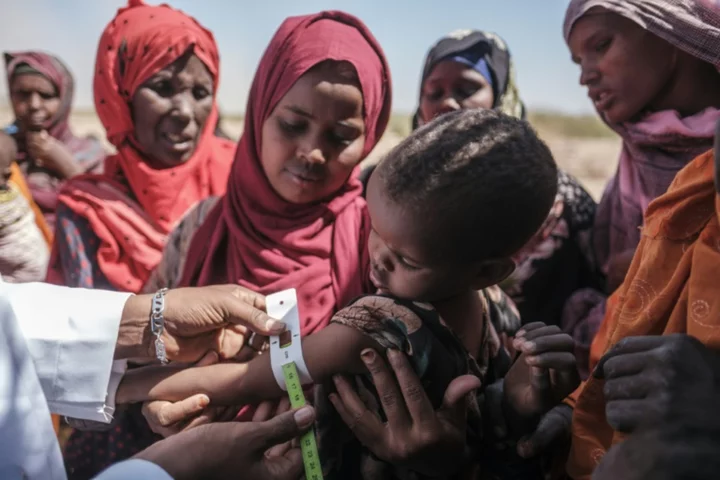A United Nations-backed conference raised $2.4 billion Wednesday to prevent famine in the Horn of Africa, which is reeling from its worst drought in decades as global temperatures rise.
The money will provide life-saving assistance for nearly 32 million people across Ethiopia, Kenya and Somalia, the world body's humanitarian agency OCHA said in a statement.
"Famine has been averted, thanks in part to the tremendous efforts of local communities, humanitarian organizations and authorities, as well as the support of donors," OCHA said.
But the sum is considerably less than the $7 billion the United Nations says is needs to provide help to people affected by drought and conflict in the region.
"The emergency is far from over, and additional resources are urgently required to prevent a return to the worst-case scenario," OCHA added.
- Years of drought -
Since late 2020, countries in the Horn of Africa -- Djibouti, Ethiopia, Eritrea, Kenya, Somalia, South Sudan and Sudan -- have been suffering the region's worst drought in 40 years.
Five failed rainy seasons have left millions of people in need, decimated crops and killed millions of livestock.
More than 23.5 million people are enduring high levels of acute food insecurity in Ethiopia, Kenya and Somalia, according to OCHA.
In Somalia alone, which is also in the throes of an Islamist insurgency, the number of people displaced from their homes by armed conflict, drought or floods now stands at 3.8 million, with 6.7 million people struggling to find food, according to figures from the UN and the Norwegian Refugee Council.
More than half a million children are severely malnourished, the two organizations added.
Deaths from hunger are on the rise in Africa because of droughts worsened by climate change and conflict, UN officials and scientists say.
The devastating drought in the Horn of Africa could not have occurred without the effects of greenhouse gas emissions, the World Weather Attribution group, an international team of climate scientists, said in a report released in April.
"We can be anything but complacent," said Andrew Mitchell, the United Kingdom's Minister of State for development and Africa. "The clear and present threat remains, and we must act now to prevent further suffering.
"Funding pledged today will help millions, but we must work together to break the cycle of crisis afflicting so many states."
Earlier this week, a group of NGOs, including Islamic Relief Worldwide and Save the Children, called on donors to fully fund the humanitarian response required for "one of the biggest climate injustices of our time."
Citing UN numbers, the organizations pointed out that despite funding mobilized to aid the region last year, an estimated 43,000 people died from the drought in Somalia alone in 2022.
- 'Epicenter' of climate emergency -
At the opening of the donors' conference -- organized in conjunction with Italy, Qatar, the UK, and the United States -- UN Secretary-General Antonio Guterres appealed for "an immediate and major injection of funding" to stop people from dying.
"We must act now to prevent crisis from turning into catastrophe," he added, recalling that last year donor countries delivered vital help to 20 million people in the region and helped avert a famine.
Guterres said people in the region -- which he described as "the epicenter of one of the world’s worst climate emergencies" -- were "paying an unconscionable price for a climate crisis they did nothing to cause."
"We owe them solidarity. We owe them assistance. And we owe them a measure of hope for the future. This means immediate action to secure their survival.
"And it means sustained action to help communities across the Horn adapt and build resilience to climate change," he added.
OCHA said the funds pledged Wednesday would allow humanitarian agencies to sustain aid pipelines of food, water, health care, nutrition and protection services.
Joyce Msuya, the UN's deputy emergency relief coordinator, welcomed the pledge but added: "We must persist in pushing for stepped-up investments, especially to bolster the resilience of people already bearing the brunt of climate change."
pdh/bfm/nro/md









